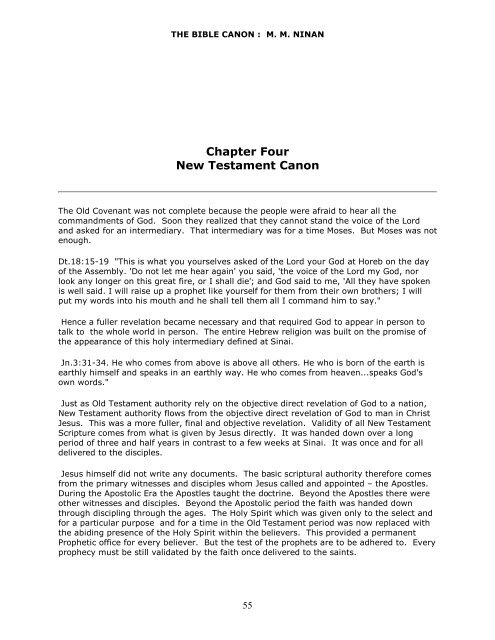Create successful ePaper yourself
Turn your PDF publications into a flip-book with our unique Google optimized e-Paper software.
THE BIBLE CANON : M. M. NINAN<br />
Chapter Four<br />
New Testament <strong>Canon</strong><br />
The Old Covenant was not complete because the people were afraid to hear all the<br />
commandments of God. Soon they realized that they cannot stand the voice of the Lord<br />
and asked for an intermediary. That intermediary was for a time Moses. But Moses was not<br />
enough.<br />
Dt.18:15-19 "This is what you yourselves asked of the Lord your God at Horeb on the day<br />
of the Assembly. 'Do not let me hear again' you said, 'the voice of the Lord my God, nor<br />
look any longer on this great fire, or I shall die'; and God said to me, 'All they have spoken<br />
is well said. I will raise up a prophet like yourself for them from their own brothers; I will<br />
put my words into his mouth and he shall tell them all I command him to say."<br />
Hence a fuller revelation became necessary and that required God to appear in person to<br />
talk to the whole world in person. The entire Hebrew religion was built on the promise of<br />
the appearance of this holy intermediary defined at Sinai.<br />
Jn.3:31-34. He who comes from above is above all others. He who is born of the earth is<br />
earthly himself and speaks in an earthly way. He who comes from heaven...speaks God's<br />
own words."<br />
Just as Old Testament authority rely on the objective direct revelation of God to a nation,<br />
New Testament authority flows from the objective direct revelation of God to man in Christ<br />
Jesus. This was a more fuller, final and objective revelation. Validity of all New Testament<br />
Scripture comes from what is given by Jesus directly. It was handed down over a long<br />
period of three and half years in contrast to a few weeks at Sinai. It was once and for all<br />
delivered to the disciples.<br />
Jesus himself did not write any documents. The basic scriptural authority therefore comes<br />
from the primary witnesses and disciples whom Jesus called and appointed – the Apostles.<br />
During the Apostolic Era the Apostles taught the doctrine. Beyond the Apostles there were<br />
other witnesses and disciples. Beyond the Apostolic period the faith was handed down<br />
through discipling through the ages. The Holy Spirit which was given only to the select and<br />
for a particular purpose and for a time in the Old Testament period was now replaced with<br />
the abiding presence of the Holy Spirit within the believers. This provided a permanent<br />
Prophetic office for every believer. But the test of the prophets are to be adhered to. Every<br />
prophecy must be still validated by the faith once delivered to the saints.<br />
55


















